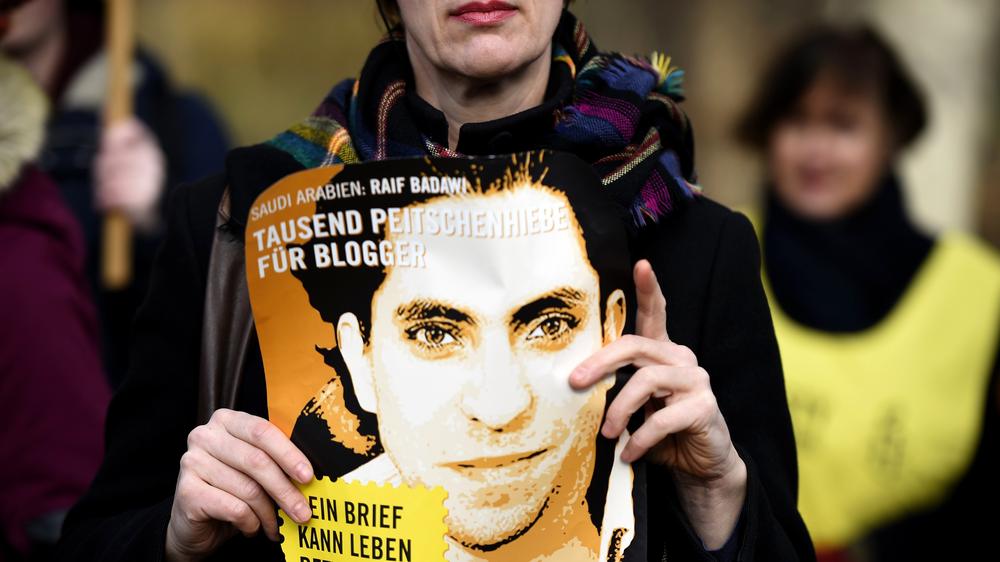Lesen Sie hier die deutsche Version des Artikels.
In January, when Raif Badawi received the first set of 50 lashes, as part of his sentence of 1,000 lashes for insulting Islam, I began wondering about the identity of the man who gave the direct order for his sentence. And I began wondering who ordered that the punishment be suspended soon thereafter.
The answer to my first question came in the form of an article written byAbdallah al-Muallami, Saudi Arabia’s Permanent Representative to the United Nationsfor the Jeddah-based newspaper al-Madina a mere three days after the first set of lashes was meted out. In the piece, Abdallah al-Muallami (english translation here) questions the motivation for the sentence, the wisdom of having the punishment be spread out over twenty sessions, and the reasons for carrying out the flogging in public. Al-Muallami concludes his article by writing, "I will not address the ways in which this sentence conflicts with international conventions and treaties, which considers it a form of torture, internationally outlawed. but had the sentence emerged from the violation of even one of God’s hudud (crimes against God), then we would have accepted it and defended it, out of faith in God’s word and law."
Abdallah al-Muallami’s tone is one of disbelief, and his article is an unprecedentedly open display of official government displeasure with the judiciary and with Raif Badawi’s sentence. Al-Muallami essentially criticizes the punishment for being nothing less than torture.,
What is going on here? Why did someone of al-Muallami’s rank use such strong words to sanction Badawi’s punishment so soon after the first flogging?
A highly-ranked Saudi source told me that many in the upper echelons of the Saudi leadership were shocked when they heard about the sentence being carried out. Some, like al-Muallami, were so angered that they refused to remain silent. When I asked my source for the identity of the man who had given the order, he declined to reveal it, but he assured me that Raif Badawi would not be flogged again.
Recently, the editor-in-chief of Al-Sharq al-Awsat, the pan-Arab daily based in London, told France 24 that there was a portion of the Saudi government that was displeased with the sentence and its execution.. The editor-in-chief is known to be well-connected to the Saudi regime, and the paper is owned by one of King Salman’s sons.
When I further investigated who may have ordered Raif's sentence,many things were revealed to me, that I have not yet revealed until today, in this article.
I learned that the head of the Jeddah Criminal Court ordered the public flogging to take place on that particular date. Furthermore, he did all he could to prevent news of the punishment from being leaked to higher authorities in the country. Under pressure, prison officials relented to his authority and the flogging was carried out.
By so doing, the head of the Jeddah court violated the law. He knew that the case was being examined by Saudi Arabia’s Supreme Court and was, of course, aware that flogging flouts all international treaties and conventions to which Saudi Arabia is a signatory, as Abdallah al-Muallami noted in his article.
With the next round of flogging now having been postponed for several times, allegedly for "health reasons," might there really be high-ranking government officials who are against Raif being flogged?
I sincerely believe that the answer is yes, and the proof is al-Muallami’s article and the fact that the rest of the sentence has continued to be postponed. But if that is true, why, then, hasn’t Raif been pardoned? Why hasn’t the sentencebeen commuted?
Based on my knowledge of the person behind the flogging sentence and its execution, it is my belief that there are men pressuring the Saudi government to harass Raif, and, sadly, there are those who are listening.. I just hope that wiser voices intervene so that this crisis, which has led to an unprecedented amount of global scrutiny, can come to an end.
Since the very beginning, this matter has not merited the attention it has received. Raif is a peaceful man who loves his country-- and a man who chose not run away from the authorities because he knew he was not wrong. He was in Britain in 2008, and could have sought asylum there. But he chose to return to Saudi Arabia and write, secure in the knowledge that he was doing nothing wrong, even if he had become a target of the country’s religious authorities.
But with Raif's case having become a global issue, it is time for the truth to come out. My intention with this article is not to accuse or defend. It is merely to find out who is behind this nightmare. Saudi Arabia owes the world at least that much.
